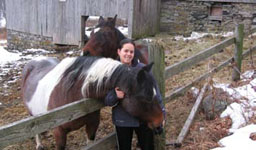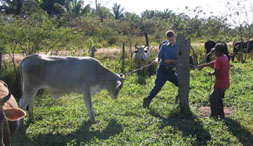Inspiring students
Two students at the University of Pennsylvania School of Veterinary Medicine were named the first winners of the Penn Vet Student Inspiration Award.


Rachel Toaff-Rosenstein and Warren Waybright, both fourth-year students at the school, will each receive $100,000 in unrestricted funding in recognition of their plans to substantially advance the frontiers of veterinary medicine.
The school announced the student awards in combination with the Penn Vet World Award, which was given to Dr. Bernard Vallat, director general of the World Organization for Animal Health (OIE) (see JAVMA, June 1, 2008).
The awards will be given annually to two current Penn veterinary students. The student awards and the Penn Vet World Award are underwritten by the Vernon and Shirley Hill Foundation.
Toaff-Rosenstein, of Bala Cynwyd, Pa., plans to earn a PhD degree in farm animal welfare and then continue on to academia and possibly work in the field as a consultant to governmental and nongovernmental organizations, animal welfare assessment and auditing groups, farmers, veterinary groups, and others.
"I would like to find a job that will allow me to use my veterinary knowledge along with my research experience from the PhD to promote farm animal welfare in a variety of settings," she said. "I want to focus not only on production and physiologic parameters as a basis for qualifying and quantifying animal welfare, but also on behavioral parameters."
Toaff-Rosenstein said the Penn award will help her to repay most of her veterinary school debt, allowing her to focus on obtaining her PhD degree.
Toaff-Rosenstein was ranked first in her class during her first and second years at veterinary school. At press time, her third-year ranking was not released. In 2007, she was elected to Phi Zeta, the honor society of veterinary medicine. She has revitalized the Penn Vet Animal Welfare Society and organized well-attended panel discussions on the topic. In 2006, she participated in the NIH/Merck Summer Research Program, working on the genetics of diabetes mellitus in dogs.
Waybright, of Gettysburg, Pa., will use his award to develop international learning programs between veterinary students in North America and Latin America. North American students would benefit from the relationship by learning about various cultures and animal health and management issues, he said, while Latin American students would learn important veterinary skills.
Waybright was inspired to develop the programs after spending two months in Bolivia as an intern with World Concern Bolivia.
"My experience was that Bolivian veterinary students were eager to share in clinical activities with North American veterinarians in order to supplement their own learning," he said.
While in Bolivia, Waybright used his veterinary skills and livestock background to help educate rural villagers in livestock husbandry. He lectured at the Universidad Autónoma Gabriel René Moreno on the American dairy industry, and took part in teaching Bolivian veterinarians how to perform some of the first two nonterminal bovine cesarean sections in the country's history.
Waybright is a member of the Penn student chapter of the Christian Veterinary Mission. He helped a group of CVM veterinarians and Bolivian veterinarians test nearly 700 cattle for brucellosis in Santa Cruz in less than seven days.
"I'm particularly proud of that because I know that we were making a big difference in public health," he said. "It really gives credence to the 'one world, one health' idea."
Waybright's other accomplishments include participating in the Food Animal Club at Penn and serving as the representative to the American Association of Bovine Practitioners.